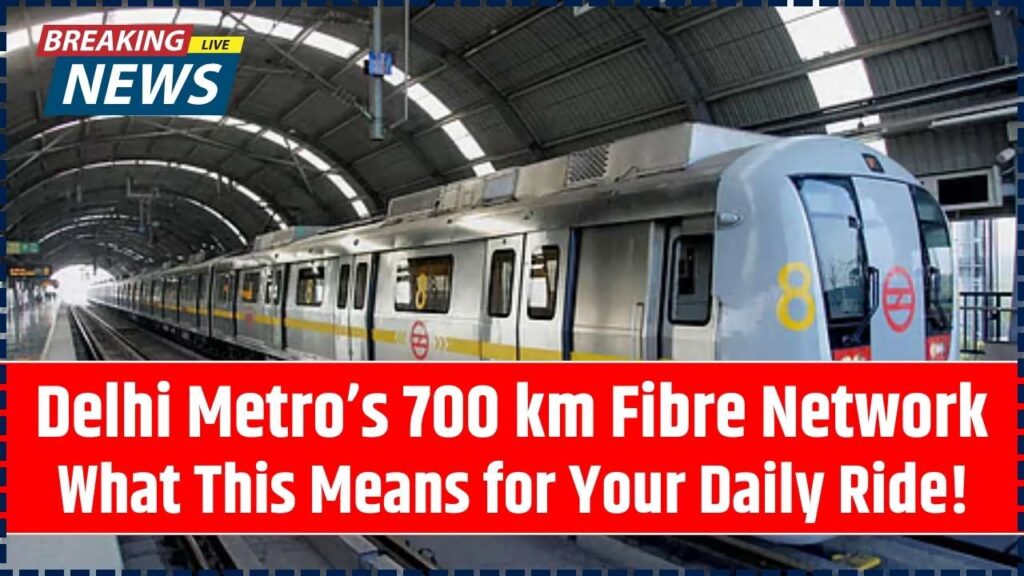
Delhi Metro’s 700 km Fibre Network: The Delhi Metro Rail Corporation (DMRC) has embarked on a significant initiative that promises to enhance the commuting experience for millions. By installing a 700-kilometer fibre optic network, DMRC aims to provide high-speed internet connectivity, improve communication systems, and pave the way for future smart city applications. This move will transform how Delhiites experience public transportation, ensuring seamless connectivity even in underground metro sections.
Delhi Metro’s 700 km Fibre Network
| Feature | Details |
|---|---|
| Project Name | Delhi Metro High-Speed Fibre Network Expansion |
| Total Fibre Laid | 700 km across all metro lines |
| Main Benefits | Improved internet access, enhanced 5G support, smart city integration |
| Key Partners | DMRC & Beckhaul Digital Technologies Pvt. Ltd. |
| Launch Date | Phased rollout starting in 2024 |
| Official Website | DMRC |
The Delhi Metro’s 700 km fibre network expansion is a game-changer for millions of commuters. From better internet connectivity to supporting smart city projects, this initiative will redefine the urban commuting experience. As the project rolls out in phases, Delhi residents can look forward to a more connected, secure, and tech-enabled metro system.
The Importance of Delhi Metro’s Fibre Network Expansion
Enhancing Internet Access for Commuters
One of the biggest complaints of Delhi Metro commuters has been poor internet connectivity, particularly in underground sections. With the 700 km fibre optic infrastructure, passengers can expect:
- Seamless high-speed internet for browsing, streaming, and working on the go.
- Reduced call drops and signal loss, even in metro tunnels.
- Enhanced public WiFi services, improving commuter experience.
Supporting 5G Network Expansion
The installation of high-speed fibre will play a crucial role in the rollout of 5G services in Delhi. Telecom companies can leverage this infrastructure to:
- Expand 5G network coverage, even in high-density areas.
- Improve data speeds, allowing commuters to enjoy lag-free browsing.
- Enable low-latency applications, essential for IoT and smart city services.
Smart City Integration & Digital Infrastructure
Beyond internet access, DMRC’s fibre network will also support various smart city initiatives such as:
- Real-time surveillance & security monitoring in metro stations.
- Better traffic management, using AI-powered analytics.
- Automated fare collection and seamless transit systems.
How This Project Benefits Daily Commuters
1. Faster Connectivity & Reliable Internet
With the integration of fibre optics, metro users will enjoy:
- Uninterrupted video calls & online meetings.
- Smoother streaming for music, videos, and social media.
- Faster app usage, allowing real-time metro updates & ride-hailing services.
2. Improved Safety & Communication
A robust fibre-backed network enhances security in metro stations through:
- Real-time CCTV monitoring, deterring crime and ensuring passenger safety.
- Better emergency response systems, improving coordination during crises.
- More effective announcement systems, keeping commuters informed.
3. Support for E-Commerce & Digital Payments
With stronger internet connectivity, commuters can seamlessly:
- Make digital payments for metro rides, food, and retail purchases.
- Shop online while commuting, boosting e-commerce activities.
- Use digital banking apps without worrying about weak signals.
AQI in Delhi Today: The Dangerous Air Quality You Need to Know About!
How to Apply for BJP ₹2500 Scheme – Online Form & Eligibility Details!
UPSC Exam 2025 Deadline Nears – Check Last Date and How to Apply!
What’s Next? Timeline & Implementation
Phased Rollout of the Project
The DMRC fibre optic network will be implemented in phases, ensuring minimal disruption to metro services. The current roadmap includes:
- Phase 1 (2024) – Initial rollout on Pink & Magenta Lines.
- Phase 2 (2025) – Expansion to Blue, Yellow, and Red Lines.
- Phase 3 (2026) – Full metro network coverage, including future extensions.
Collaboration with Telecom Providers
DMRC is partnering with telecom companies to ensure:
- Affordable & high-speed connectivity plans for commuters.
- Increased network capacity, handling millions of users daily.
- Integration with metro WiFi services, offering free access in select areas.
FAQs On Delhi Metro’s 700 km Fibre Network
1. Will this upgrade make metro WiFi free?
While public WiFi services are expected to improve, the availability of free WiFi will depend on telecom partnerships and DMRC policies.
2. How will this impact 5G connectivity?
The fibre network will serve as a backbone for 5G expansion, ensuring better coverage and higher speeds, even in metro tunnels.
3. When will commuters start seeing improvements?
The first phase is expected to roll out in 2024, with improvements in internet connectivity and signal strength noticeable by mid-year.
4. How will this affect metro ticketing systems?
With better internet connectivity, metro users can expect faster QR code ticket scanning, improved smart card recharge systems, and cashless payment options.
5. Will this benefit businesses near metro stations?
Yes! Stronger network infrastructure will attract more businesses, supporting cashless transactions, e-commerce, and digital marketing opportunities.








